#The Records of Nobita Spaceblazer
Explore tagged Tumblr posts
Text
Doraemon Long Stories Vol. 2: The Records of Nobita, Spaceblazer

May contain spoilers below the break. My review of this story's movie adaptations can be found here.
From what I recall, the first movie adaptation of this one follows the manga very closely (the remake less so). The most obvious differences probably come down to how the climax plays out. On balance, I think I prefer the movie version; the manga represents another entry in Doraemon Long Stories where the plot resolution leans heavily on contrivance, whereas the movie adapted this plot thread to be more character driven. On the other hand, the manga includes a good moment for Nobita wherein he has a climactic confrontation with one of the main antagonists, which did not happen in the original movie. (This scene was incorporated into the 2009 movie remake, though that wasn't enough to save the film in my opinion.)
I still don't find this to be one of the more engaging Doraemon stories, but the emotional beats probably landed better for me in the manga, perhaps just by virtue of the medium making them feel better paced.
4 notes
·
View notes
Text


Suneo's face is so meme---
Source : Doraemon the Movie - The New Record of Nobita's Spaceblazer (ドラえもん 新・のび太の宇宙開拓史)
11 notes
·
View notes
Text

🚀 °○•.☆.•○° 🚀
The record of nobita's spaceblazer's (2009 remake)
#doraemon#ドラえもん#doraemon anime#nobita nobi#のび太#tamako nobi#野比 玉子#nobisuke nobi#野比 のび助#fujiko f fujio#fujiko a fujio#anime#anime movie#2009#☆
13 notes
·
View notes
Text
Other than gadgets, Doraemon keeps a lot of mundane items in his pocket, like cutlery, tissue paper, a hose, and a kettle.

Source: Nobita's Dinosaur, 1980 (manga, Doraemon Long Stories)

Source: ロボットペーパー, 1976 (manga)
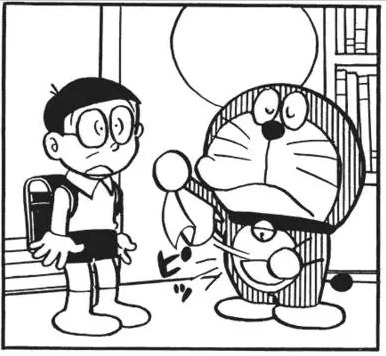

Source: ばくはつこしょう, 1977 (manga)
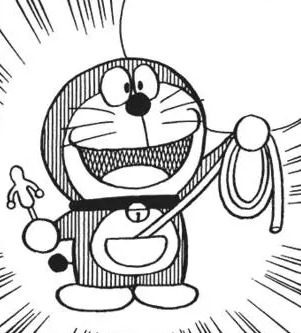
Source: そっくりかかし, 1981 (manga)
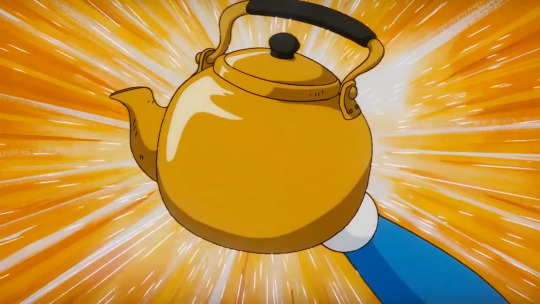
Source: Nobita in the Robot Kingdom, 2002

He also carries normal food like gum (although he told Nobita it was a gadget to trick him), lollipops, chocolate, and of course dorayaki.
Source: シャラガム, 1976 (manga)

Source: 強力ウルトラスーパーデラックス錠, 1989 (manga)
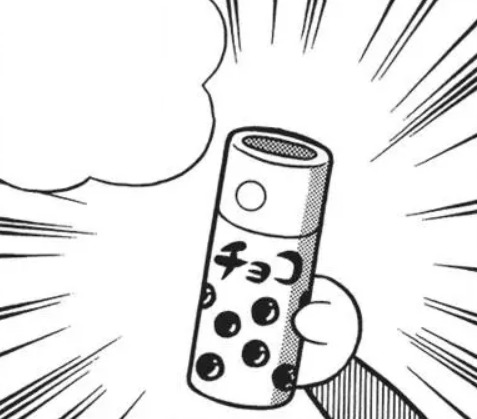
Source: ふんわりズッシリメーター, 1989 (manga)

Source: 雪男のアルバイト, 1979 (manga)

Source: The Records of Nobita, Spaceblazer, 1981 (manga, Doraemon Long Stories)
42 notes
·
View notes
Text
Chamill from Doraemon: The New Record of Nobita's Spaceblazer film








8 notes
·
View notes
Text
Doraemon in hindi movie list

“ Doraemon: Nobita in the Robot Kingdom“.“ Doraemon: Nobita and the Winged Braves“.“ Doraemon: Nobita and the Legend of the Sun King“.“ Doraemon: Nobita Drifts in the Universe“.“ Doraemon: Nobita’s Great Adventure in the South Seas“.“ Doraemon: Nobita and the Spiral City“.“ Doraemon: Nobita and the Galaxy Super-express“.“ Doraemon: Nobita’s Diary on the Creation of the World“.“ Doraemon: Nobita’s Three Visionary Swordsmen“.“ Doraemon: Nobita and the Tin Labyrinth“.“ Doraemon: Nobita and the Kingdom of Clouds“.“ Doraemon: Nobita and the Animal Planet“.“ Doraemon: Nobita and the Birth of Japan“.“ Doraemon: The Record of Nobita’s Parallel Visit to the West“.“ Doraemon: Nobita and the Knights on Dinosaurs“.“ Doraemon: Nobita and the Steel Troops“.“Doraemon: Nobita’s Great Adventure into the Underworld”.“ Doraemon: Nobita and the Castle of the Undersea Devil“.“ Doraemon: Nobita and the Haunts of Evil“.“ Doraemon: The Records of Nobita, Spaceblazer“.Doraemon is also the highest-grossing anime movie franchise of all time, and one of the highest-grossing animated movie franchises in the world. The franchise was previously known as Dora the Movie until 2004.Īt the Japanese box office, Doraemon grossed more than 100 billion yen in revenue and sold more than 100 million tickets, having surpassed Godzilla as Japan’s highest-grossing film franchise. Toho currently has worldwide distribution and licensing rights for all films in the series. Since 1980, all of these movies to date have been released by Toho.

This list of Doraemon movies includes both feature films and short films based on the manga and anime series Doraemon.

The anime series is currently airing on Disney Channel and airing on Disney + Hotstar. It is the highest rated children’s show with over 100 million viewers. It is the most successful Japanese anime in India. It has won the Nickelodeon Kids’ Choice Awards India twice in a row for Best Children’s Show (20) and was nominated in the 2014, 2016, 2017, 20 edition for the same category. The Doraemon franchise arrived in India on Februwhen the anime first aired on Hungama TV. The story revolves around a robotic earless cat named Doraemon, who travels back in time from the 22nd century to help a boy named Nobita Nobi (野 比 の び 太, Nobi Nobita). The series has also been adapted into a successful anime series and media franchise. (Last Updated On: December 22, 2020) About Doraemonĭoraemon (Japanese: ド ラ え も ん Japanese pronunciation: ) is a Japanese manga series written and illustrated by Fujiko Fujio, the pseudonym of the duo Hiroshi Fujimoto and Motoo Abiko.

1 note
·
View note
Link
While Nobita is sleeping, he suddenly feels the floor is trembling, like there would be an earthquake in his room. A little rabbit from an alternate universe named Chamii opens...
0 notes
Link
http://ift.tt/eA8V8J via DramaSerialDotTV
0 notes
Text
Doraemon Movie Review: The Records of Nobita, Spaceblazer (1981) and The New Record of Nobita's Spaceblazer (2009)
What is Doraemon? The title character of the Doraemon manga and anime is a blue robotic cat from the 22nd Century who keeps an array of high-tech gadgets in a portable pocket dimension on his belly, and has traveled from the future to improve the fortunes of a hapless schoolboy named Nobita. Although relatively obscure in the English-speaking world, Doraemon is a Mickey-Mouse-level cultural icon in East Asia (and some other regions, too). The Doraemon franchise was a big part of my childhood, and there are still elements of it that I enjoy now. Doraemon has released theatrical films almost annually since 1980, most of which involve Nobita and his friends (kind Shizuka, brash Gian, and crafty Suneo) getting swept into adventures thanks to Doraemon's gadgets. Despite being of potentially broad appeal to fans of science fiction and animated films, there are very few English reviews of the Doraemon movies, so I'm embarking on a project to write about all the films that have come out so far. Good luck to me…
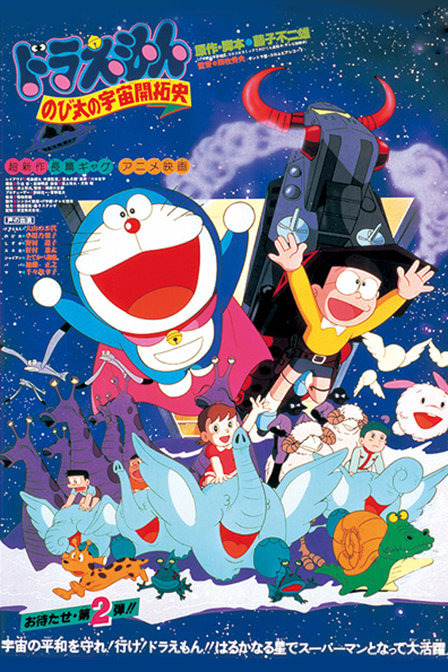
Movie premise: Nobita and his friends protect the pioneering settlers of a distant planet from an evil corporation, space Western style.
My spoiler-free take: An atypical Doraemon film that focuses more on Nobita and Doraemon bonding with movie-exclusive characters than on their regular friend group. That may be appealing to some, but it’s not quite my cup of tea.
Despite that, I would still recommend the original over the 2009 remake, which adds new plot points and story arcs that largely fell flat for me.
POTENTIAL SPOILERS AFTER THIS POINT
Review: This is an unusual Doraemon movie in a number of ways, probably due to it being such an early film installment in the franchise. Something that is well known to Doraemon fans is that the main characters tend to come across as better friends in the movies than in the regular manga chapters or anime episodes. (For example, in typical Doraemon stories, Gian and Suneo are much more likely to bully Nobita than to show concern for him.) In this film, however, the character interactions feel more similar to those in the mainline series.
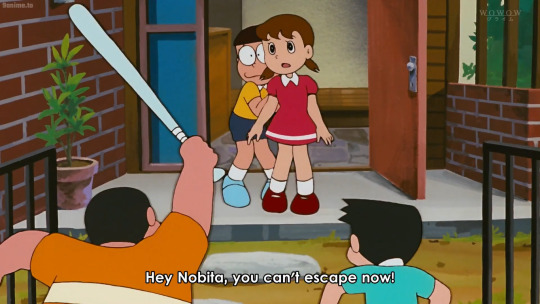
(Yep, this is more like the usual dynamic among the main characters...)
There is also the fact that Shizuka, Gian, and Suneo aren’t involved with most of the adventure in this story. Doraemon and Nobita are the only mainline protagonists present for most of the film, and much more emphasis is placed establishing their friendship with new, movie-exclusive characters. I can see how that could make for a compelling narrative to some viewers, but being generally more invested in the relationships among the series regulars, it didn’t do too much for me.
Be that as it may, Nobita’s usual friend group does get a moment to shine during the climax. Shizuka is the MVP here, being the one who convinces the others to help out. I don’t think I appreciated as a child how often Shizuka plays a critical role in the movies, especially in the older entries. In fact, it might be interesting to keep track of how many times it happens as I go through the film series...
Shizuka-saves-the-day count (cumulative): 1
Star rating: ★★★☆☆
This movie received a remake in 2009 as part of the 2005 Doraemon anime reboot, so I will turn to that next.
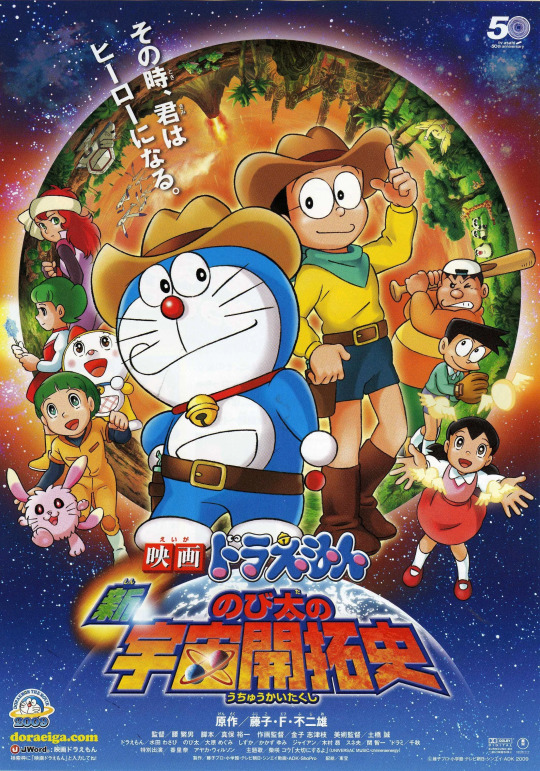
Review: As with the other early movies to come out of the reboot, this is a very visually interesting Doraemon movie that experiments a lot with the art and animation style. Although the general story remains the same, there are also some substantial changes to the plot. I liked that in this version, Doraemon offers a reasonable-sounding solution to Nobita’s request to provide a new vacant lot for him and his friends to play in, instead of the bizarre “solution” he comes up with in the original (which is to bring out a miniature baseball field so the kids can watch miniature figurines play baseball... potentially interesting, but not quite what they asked for).
Besides that, however, I thought most of the other narrative changes fell flat. The biggest alteration is the addition of an entirely new character, Morina, who goes through her own subplot that turns out to be critical to the final resolution of the movie. Unfortunately, beyond having a tragic backstory, she doesn’t come across as particularly sympathetic or involved with the main plot for most of the film. As a result, I didn’t find her story arc very engaging, especially in contrast to the resolution of the original movie, which made elegant use of a gadget (the Time Cloth) that had been set up earlier in the story.
Star rating: ★★☆☆☆
Original or remake? I’m putting in an unambiguous vote for the original here. For whatever faults it might have, it at least tells a more cohesive story than the remake.
7 notes
·
View notes
Text
Doraemon: The New Record of Nobita, Spaceblazer
Doraemon: The New Record of Nobita, Spaceblazer
While Nobita is sleeping, he suddenly feels the floor is trembling, like there would be an earthquake in his room. A little rabbit from an alternate universe named Chamii opens the door between the dimensions using a hammer and gets inside Nobita’s room through the floor. Nobita wakes up and Doraemon hears somebody steal food from the fridge in the kitchen. It is Chamii, who gets caught by…
View On WordPress
0 notes
Text
The US English dub of Doraemon has gotten flack for rewriting Shizuka’s personality to be more into sports. But how much basis does this have in the original work actually?

Shizuka is not seen playing sports very often in the Japanese manga and anime, however it would be false to say that she is uninterested or bad at them. If money were no object, one of the presents she’d wish for on her birthday would be a tennis court (しずちゃんの心の秘密, 1982 manga story).
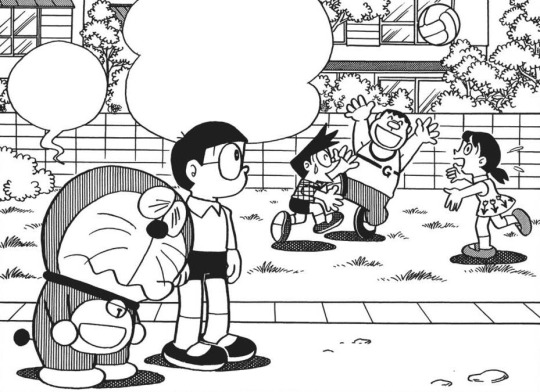
She is also shown playing volleyball in some stories.
Source: 地底のドライ・ライト, 1982 (manga)
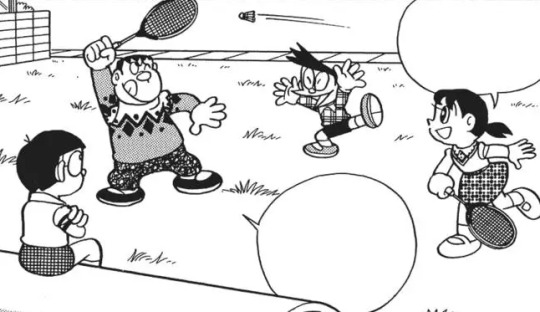
She keeps up with Gian in a game of badminton.
Source: ロビンソンクルーソーセット, 1983 (manga)
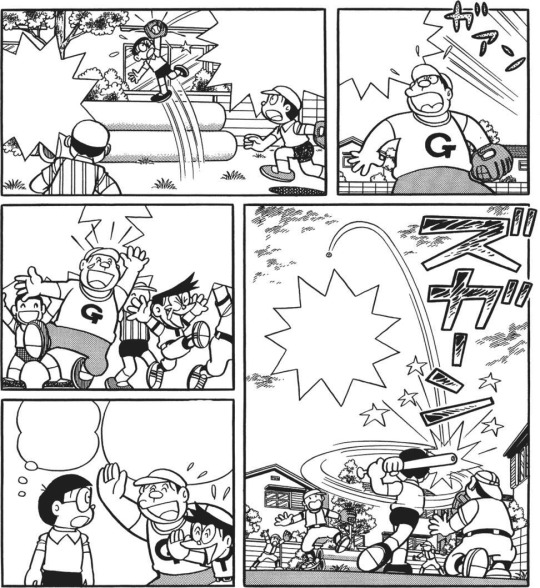
When she tries playing baseball after using the “Substitution Rope” (入れかえロープ) to swap bodies with Nobita, she proves to be a star player, even hitting a home run.
Source: 男女入れかえ物語, 1985 (manga)
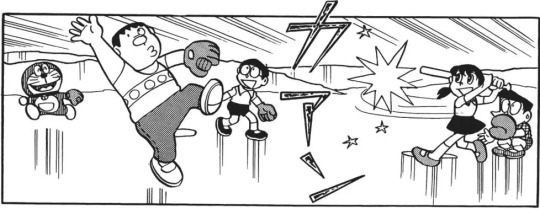
She plays baseball in her own body a few times as well.
Source: 大氷山の小さな家, 1978 (manga)
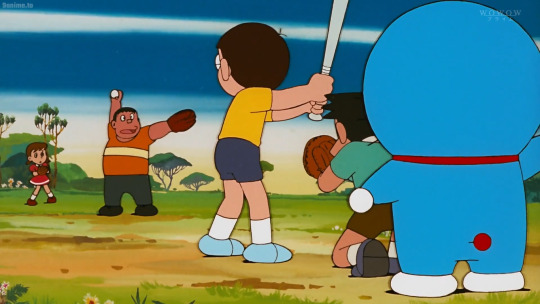
Source: The Records of Nobita, Spaceblazer, 1981
18 notes
·
View notes
Text
You Wouldn’t Really Know Shizuka from the Doraemon Movies
If you’ve experienced enough Doraemon media, you’ve probably noticed that the movies tend to emphasize the main characters’ positive qualities, which often paints a very different picture of them from the regular manga and episodes. The contrast is especially noticeable with Nobita, Gian, and Suneo, who in the mainline series are frequently cast as anti-role models to show children how not to behave.
Shizuka, on the other hand, is already kind and morally upstanding by default, so it’s only natural for the movies to continue portraying her that way. That makes Shizuka pretty much the same between the regular series and the movies, right? I would argue not exactly, and unfortunately her character in the movies suffers for it.
It’s not that the movies never characterize Shizuka well. She’s had very important roles in some of them: in my reviews, I counted at least eight films in which her actions are critical to resolving the plot. Certainly one can gather from the movies that she’s compassionate, quick-witted, brave, and adventurous, and all of these things are true about Shizuka in the mainline series.
However... if you only watched the movies, you might not realize that Shizuka also enjoys messing with other people for fun...
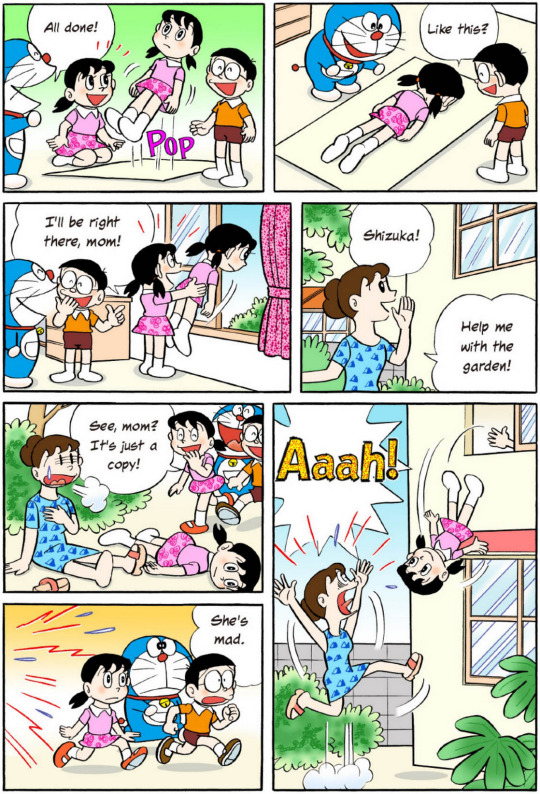
... or can be very blunt towards her friends...
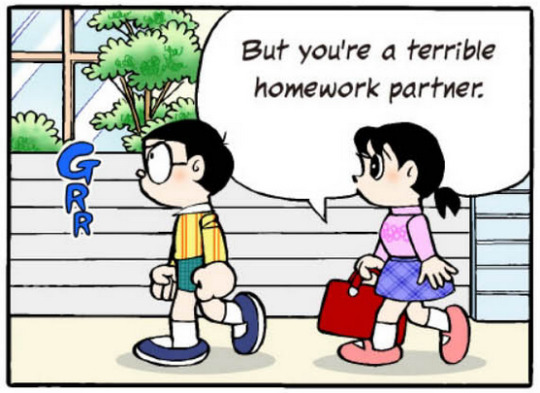
... or participates in schemes to get even with people who have wronged her...
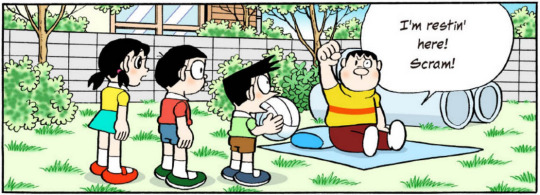
[A short time later...]
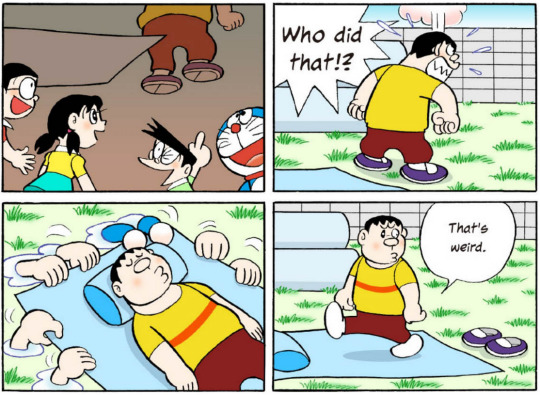
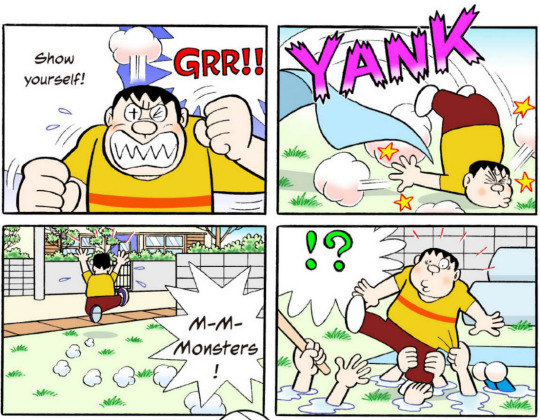
... or becomes disproportionately violent when she’s upset (“Janie” being one of her dolls)...
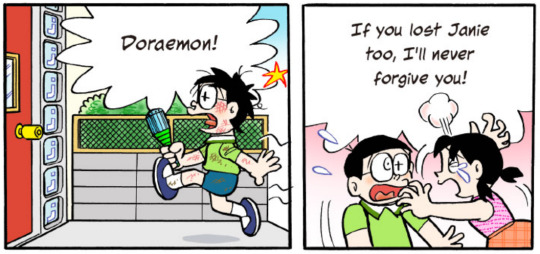
... or lies to get out of things she doesn’t want to do.
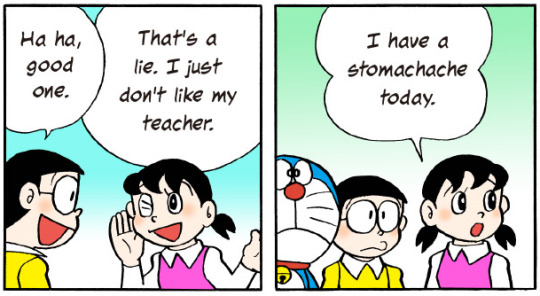
(If any of this seems like it conflicts with Shizuka’s usual characterization, I don’t think it does. When I was Shizuka’s age, I was also a “good kid” who stayed out of trouble and got along with most of my peers, and I still did every one of these things.)
From the movies alone, you might even miss that Shizuka is supposed to be bad at playing the violin, which is her one “flaw” that the franchise likes to highlight with any regularity. Her violin playing has shown up in two movies so far (Nobita and the Knights on Dinosaurs and Nobita and the Kingdom of Clouds), but only in very brief scenes where we don’t see anyone else reacting to it. (Edit: I’d forgotten that she also plays the violin in The New Record of Nobita’s Spaceblazer. There, it is a similar situation in which she is only seen practicing alone. She is finally shown playing in front of an audience during the end credits of Nobita’s Sky Utopia, which I hadn’t had a chance to see when I first wrote this post.)
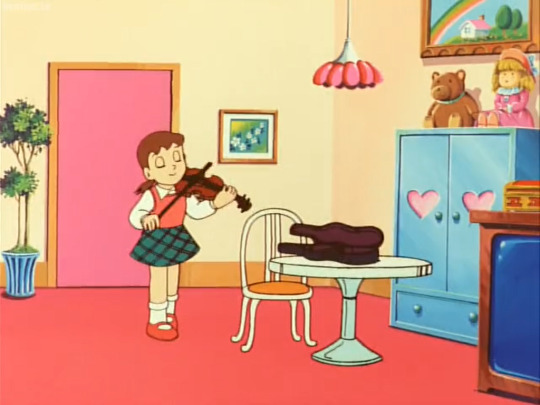
Of course, there are other ways to add dimensionality to a character besides giving them flaws. However, Shizuka in the movies almost never exhibits quirks of any kind, except maybe for being just a bit too obsessed with bathing. (Now that they rarely neglect to include in the movies, for some reason...)
In the main series, Shizuka is often the voice of reason who is strung along by the foolishness and craziness of the others around her, but she still gets her kicks. When the kids test out Doraemon’s Mysterious Trash Chute, there’s the implication that she goes the extra mile to throw in a concrete beam. (As far as I know, none of the animated adaptations of this story have included this particular detail, which is disappointing.)
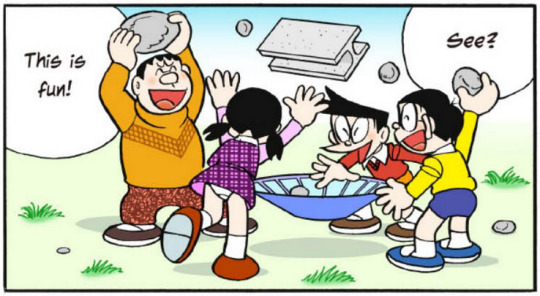
There’s also the time she hesitates to partake in karaoke, only to have trouble putting down the mic once her turn comes around.

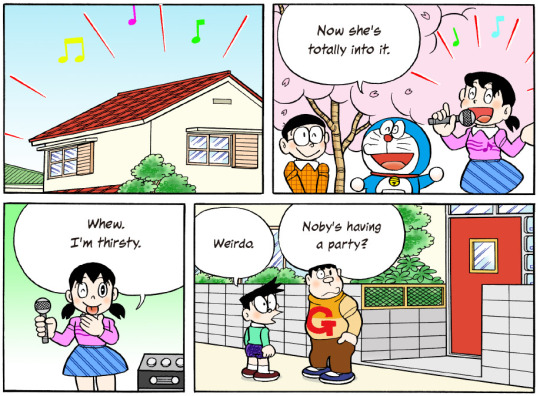
Even the manga counterparts to the movies sometimes contain facets of Shizuka’s character that weren’t adapted into the films themselves. (Perhaps that’s not a surprise considering that the original author had a more direct hand in the manga.) Nobita’s Three Visionary Swordsmen is already one of the best movies when it comes to Shizuka’s portrayal, but if you’ve never read the manga version, you probably wouldn’t have known that she aspires to be a diplomat working for world peace.
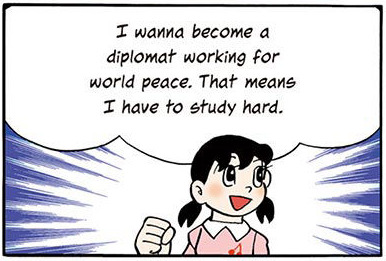
Then there’s this moment in Nobita and the Tin Labyrinth, where she makes a bet with Suneo over whether Nobita is lying to them. This conversation does happen in the movie, but the film version doesn’t quite get across just how smug Shizuka looks when she takes that bet.
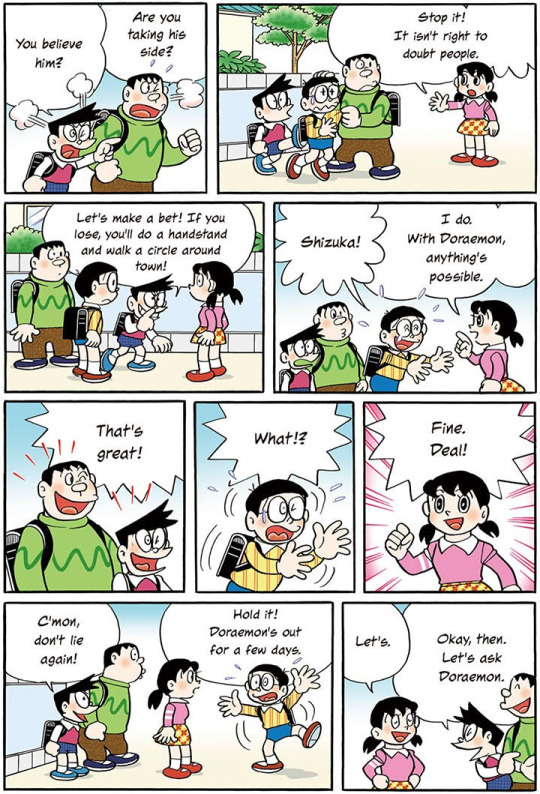
And check out how pleased she is to be eventually proven right! (This expression didn’t make it into the movie either.)
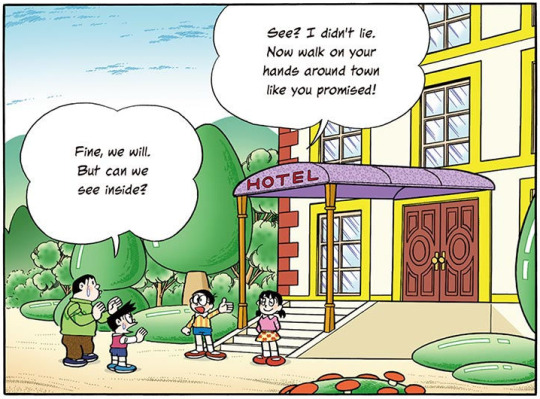
Nobita in the Robot Kingdom was not written by the original manga author, but I’ve discussed before how the manga version of that story gave Shizuka an important part that was unfortunately cut out of the film.
Is this really a problem? After all, it’s well established that the other main characters in the movies don’t act exactly like they normally do in the manga either. With the others, however, subverting their usual roles is precisely what gives them character depth. Relegating Shizuka solely to being “the nice one”, which she already comes across as most of the time, makes her feel much more static by comparison.
An understandable concern is that swinging the pendulum too far in another direction might erode Shizuka’s kind image, but this need not be the case. Like anyone else, nice people can say and do some very un-nice things, and the trick for a storyteller is to interrogate what might lead them to act in such a way. I think the Nobita in the Robot Kingdom manga does this very well, but an example found in the films themselves can be seen in Nobita and the Steel Troops.
In this movie, (SPOILERS) Shizuka rescues a severely damaged robot spy, Riruru, and works on nursing her back to health. After Riruru explains the history of the robot society that she belongs to, Shizuka observes its parallels to human history. However, Riruru, who is still operating under a belief in robot supremacy, takes offense to this comparison and tries to shoot Shizuka, which results in Shizuka expressing regret and bitterness over having saved her in the first place. Shizuka gets over this very quickly and it’s not explored much further, but this still a rare deconstruction of her role as “the nice one”. Sometimes, being kind is hard.
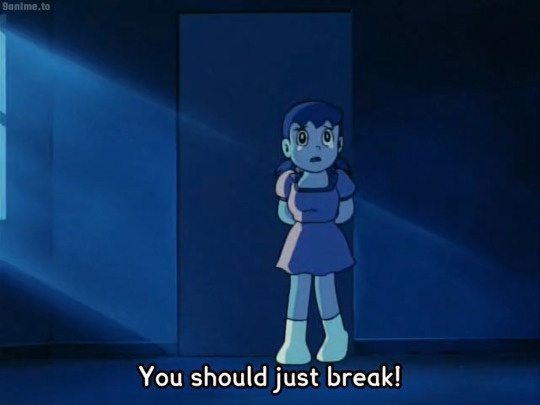
Overly-long story short, it would be nice if the Doraemon movies let Shizuka do more “bad” (or mischievous, or just plain weird) things, especially for the sake of good.
48 notes
·
View notes
Text
Ranking the Doraemon Movies (Updated 2024)

Having watched (or rewatched) and reviewed every Doraemon movie released up to this point, the temptation to rank them is hard to resist. I’ll stress that the following ranking is of course based on my own opinions and I can’t pretend to represent any sort of consensus viewpoint. The Doraemon films have played with such a wide variety of settings and story genres that it’d only be natural for different viewers’ rankings to differ dramatically based on personal taste.
It’s striking to me that even after over 40 installments, there are very few Doraemon movies that I’d outright consider “not worth watching”. Not only that, but each cinematic storyline manages to do something that sets itself apart from the others (excluding remakes, that’s a total of 38 unique narratives to date). Considering how easy it would be for the nearly annual releases of such a long-running, popular franchise to descend into staleness and mediocrity, that is quite an achievement. No, not every Doraemon film is a winner, and I’m not going to claim that even my favorite movies in the franchise are the pinnacle of animated entertainment. However, if you enjoy family-friendly science fiction about adventure and friendship, there are certainly worse ways to spend an evening than with a Doraemon movie that has an enticing premise.
Full ranking (with links to individual reviews) below the break...
Note that for reasons given in my review, the original Nobita and the Haunts of Evil (1982) is disqualified from ranking.
From highest to lowest rated:
Nobita and the Birth of Japan (2016)
Nobita’s Great Adventure into the Underworld (1984)
Nobita and the Kingdom of Clouds (1992)
New Nobita’s Great Demon (2014)
Nobita’s Little Star Wars 2021 (2022)
Nobita’s Little Star Wars (1985)
Nobita’s Three Visionary Swordsmen (1994)
Nobita and the Steel Troops (1986)
Nobita’s New Dinosaur (2020)
Nobita’s Sky Utopia (2023)
Nobita and the Windmasters (2003)
Nobita and the Legend of the Sun King (2000)
Nobita’s Chronicle of the Moon Exploration (2019)
Nobita’s Earth Symphony (2024)
Nobita’s Diary on the Creation of the World (1995)
Nobita in the Robot Kingdom (2002)
Nobita and the Tin Labyrinth (1993)
Nobita’s Dinosaur (1980)
Nobita’s Dinosaur (2006)
Nobita and the Castle of the Undersea Devil (1983)
Nobita and the Galaxy Super-express (1996)
Nobita in the Wan-Nyan Spacetime Odyssey (2004)
Nobita and the Winged Braves (2001)
Nobita’s Treasure Island (2018)
Nobita’s Secret Gadget Museum (2013)
Nobita and the Animal Planet (1990)
Nobita’s Great Adventure in the Antarctic Kachi Kochi (2017)
The Records of Nobita, Spaceblazer (1981)
Nobita and the Birth of Japan (1989)
Stand by Me Doraemon 2 (2020)
Nobita and the Knights on Dinosaurs (1987)
The Record of Nobita’s Parallel Visit to the West (1988)
Nobita and the New Steel Troops (2011)
Nobita and the Green Giant Legend (2008)
Nobita’s New Great Adventure into the Underworld (2007)
Nobita and the Spiral City (1997)
Nobita’s Great Adventure in the South Seas (1998)
Nobita’s Space Heroes (2015)
Nobita Drifts in the Universe (1999)
The New Record of Nobita’s Spaceblazer (2009)
Nobita’s Dorabian Nights (1991)
Stand by Me Doraemon (2014)
Nobita and the Island of Miracles (2012)
Nobita’s Great Battle of the Mermaid King (2010)
Also, because I have to be a dork about this, I made a graph of this ranking with the movies ordered by release date. Each film is assigned a score based on its ranking, with the highest-rated having a score of 44 and the lowest-rated having a score of 1. The green line on the left separates the entries produced within the manga author Fujiko F. Fujio’s lifetime from those that came afterward, whereas the green line on the right marks the beginning of the 2005 anime reboot.

It’s interesting to see where the rises and dips are (or so I think). Looks like I’m not a fan of most movies that came out during the first decade of the anime reboot! More recent Doraemon films, however, have generally done pretty well in the rankings. I look forward to seeing what this franchise brings next!
53 notes
·
View notes